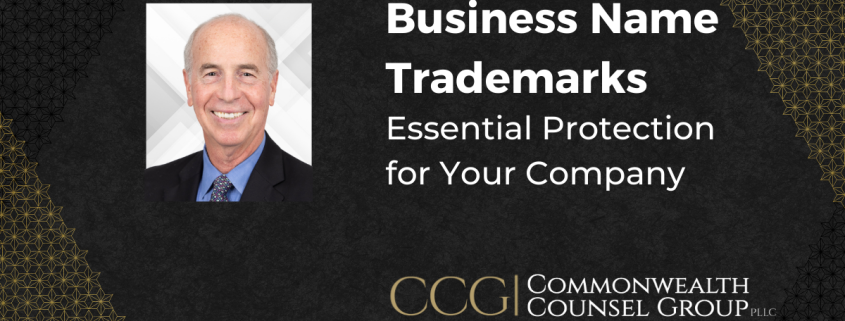Business Charter Names and Trademarks: Essential Protection for Your Company
Starting a new business? Understanding business charter name and/or trademark protection could save you thousands of dollars in costly rebranding and legal disputes. As a trademark attorney and former USPTO Examining Attorney with over 45 years of experience, I’ve witnessed countless businesses face devastating consequences from inadequate charter name and/or trademark research clearance whenever a third-party issued a cease-and-desist letter, asserting prior and superior rights in such trade designations.
Difference between a Trademark and a Charter Name? A trademark and/or service mark is a legally protected mark that identifies the source and origin of your company’s goods or services and prevents others from using confusingly similar designations that might likely confuse the consuming public. Unlike a business charter name that may be issued by any Secretary of State’s Office (thereby only providing some measure of common law rights), a federal registration, on the other hand, as issued by the USPTO, provides constructive notice of your trademark use throughout the United States and, most importantly, grants substantive nationwide rights…and defenses…that can be enforced in federal court.
Understanding Business Name Protection
The relationship between business charter names and trademarks is more complex than most entrepreneurs realize. According to USPTO statistics, approximately 30% of trademark applications are rejected due to conflicts with existing marks that are either registered and/or the subject of pending applications in the USPTO. This high rejection rate underscores the importance of conducting a thorough trademark clearance search before launching your brand.
Common Business Charter Name Mistakes
Here’s a dangerous myth that costs business owners millions annually: “If the Secretary of State approves my business charter name, then I’m good to go”. This misconception couldn’t be further from the truth. State approval of your business charter name offers virtually no trademark protection because Secretary of State offices do not check records in the USPTO for any conflicts and, furthermore, the legal standards for granting a charter name, in any Secretary of State’s Office, are not the same higher standards of ascertaining whether there is a “likelihood of confusion” as when applying for a federal registration.
Real-World Consequences: A Case Study
Let me share a case that illustrates the costly reality of inadequate trademark clearance: Several years ago while representing a Louisville-based restaurant chain, the client identified a small restaurant in central Indiana using its identical service mark within the context of a different design logo. My client had over 15 incontestable federal registrations incorporating its house mark in a variety of wording and designs for casual dining restaurant services (an incontestable registration, which can be obtained after the fifth consecutive year from the registration date, provides conclusive evidence of the registrant’s exclusive right to use such mark in interstate commerce). The Indiana restaurant’s attorney, primarily a personal injury lawyer, incorrectly insisted that their state charter name gave them “absolute right” to use designation within Indiana.
The consequences were severe, whereby the infringer incurred thousands of dollars in completely rebranding their restaurant to a mark not confusingly similar thereto including, but not limited to, the costs of new signage; printing of new menus; changing their webpage marketing; the loss of revenues during such a transition; and incurring significant legal fees.
How to Proactively Protect Your Charter Name and/or Trademark
When evaluating whether you can use a business charter name or trademark, several critical factors must be considered when first syndicating or organizing your new business (this involves a subjective evaluation best conducted by an experienced trademark attorney well versed in substantive trademark law by searching, at the minimum , the USPTO data base and ascertaining the use of such designations by third-parties at common law) (and our firm routinely recommends addressing such intellectual property concerns in organizing new businesses):
- A comparison of your proposed charter name and/or trademark relative to the use of other third-party designations considering the sound, meaning and/or appearance of the respective marks (again, this involves a “federal search” of records in the USPTO and, moreover, a “common law” search of other marks that may not be of record in the USPTO);
- Consider whether the goods and/or services are related and/or sold within the same channels of trade;
- Are the goods and services sold to the general public as compared to more sophisticated consumers that may be more discerning in determining the source and origin of the goods; and
- If the mark is to be used in a logo format, are the design components unique and inherently distinctive.
For some clients, who want more assurances (and willing to incur more expense), I’ll commission an outsourced, computerized report that generates all possible phonetic equivalents and comparisons of design components, and even search international data bases.
Next Steps for Business Name Protection
Before investing in your brand, take these essential steps:
- Don’t rely solely on state business name availability in any Secretary of State Office;
- Consult with a highly qualified trademark attorney;
- Approve and authorize comprehensive trademark searches; and
- Clear your charter name and/or trademark BEFORE making significant investments.
Remember: When it comes to business charter name or trademark protection, prevention is significantly less expensive than addressing a rebranding situation.
Ready to protect your business name? As part of the syndication of your new business, schedule a trademark consultation today to secure your brand’s future. Our experienced trademark attorneys will help you navigate the process efficiently and effectively.
Sources and Further Reading:
- USPTO Trademark Basics
- International Trademark Association Resources
- American Bar Association Trademark Section
About the Author: David H. Cooper is a corporate business/commercial transactional attorney at Commonwealth Counsel Group PLLC. His first position out of law school was as a Trademark Examining Attorney at the USPTO, where he prosecuted thousands of applications seeking federal registrations.

